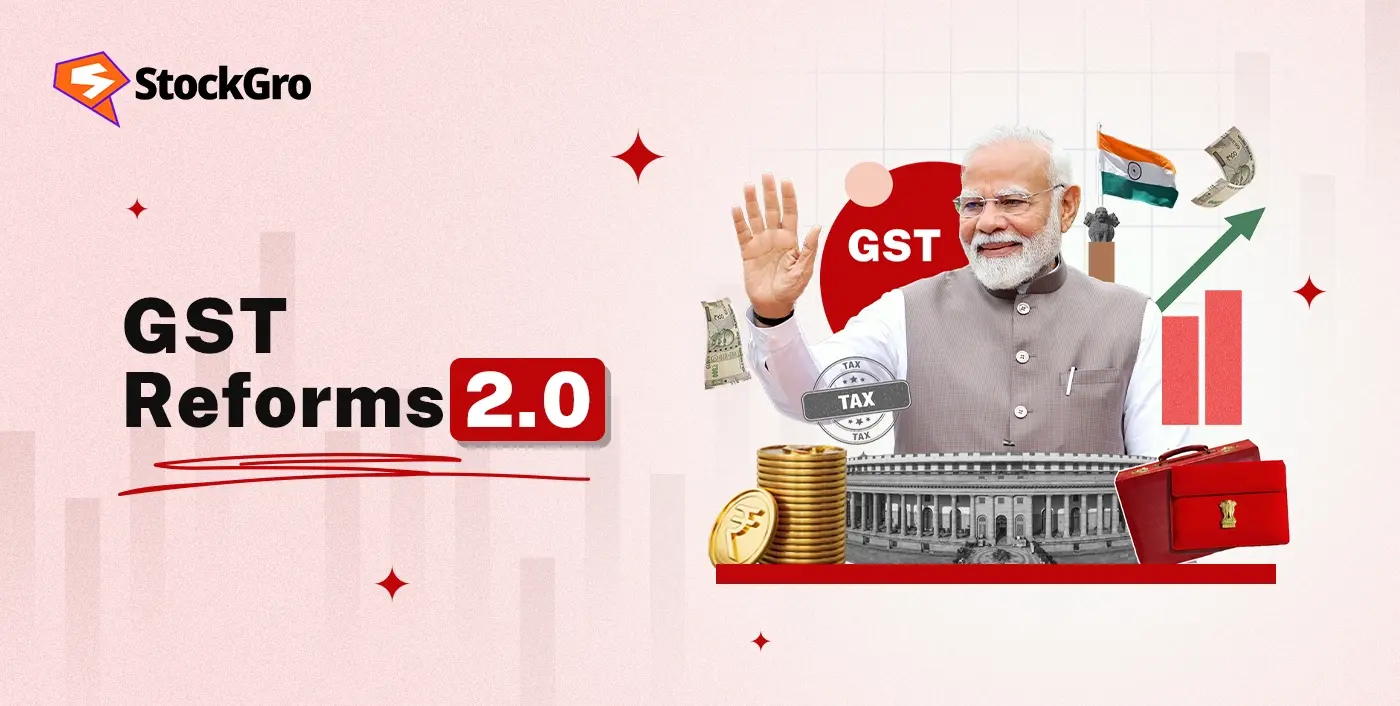
India’s tax system has often been criticised for being complicated. When Goods and Services Tax (GST) was introduced in 2017, the aim was to simplify indirect taxes. But with four slabs — 5%, 12%, 18%, 28% — plus extra cess on certain goods, it didn’t exactly feel simple for businesses or consumers.
In his Independence Day 2025 speech, Prime Minister Narendra Modi announced GST Reforms 2.0, promising a major overhaul by Diwali. The plan? Collapse the current four slabs into two main rates — 5% and 18%.
For you and me, that means many products could get cheaper. For the economy, it’s a bet that lower taxes will increase consumption and support growth in FY2025-26. And for the stock market, this could mean a rally in sectors directly linked to consumer spending.
What changes in GST mean?
Here’s a snapshot of what’s being proposed:
| Current GST Rate | Proposed Rate | Impact on Products |
| 12% | 5% | Everyday FMCG, ayurvedic products |
| 28% | 18% | Cars, two-wheelers, cement, appliances |
| 18% | Remains 18% | Most services, insurance, premium goods |
| 5% | Remains 5% | Essentials like food grains |
The government expects a ₹50,000 crore fall in tax revenue, but is betting that cheaper goods will push up demand. Retail prices of many products could fall by 4–5%, making FY2025-26 a key consumption-driven year.
Also read: GST and Income Tax Impact on Stock Market Sectors
Auto sector: The biggest winner
Cars and two-wheelers currently attract 28% GST. A cut to 18% would instantly make vehicles 10% cheaper. That’s a big deal when you’re buying a ₹1 lakh scooter or a ₹10 lakh car.
Likely beneficiaries in the stock market:
- Maruti Suzuki – dominates small car sales, price cuts here could fuel volumes.
- Hero MotoCorp, Bajaj Auto, TVS Motor, Eicher Motors – strong two-wheeler demand expected.
- Tata Motors, Mahindra & Mahindra – across EVs, SUVs and tractors.
- Ashok Leyland – cheaper commercial vehicles could benefit fleet operators.
For FY2025-26, auto demand could be one of the strongest drivers of earnings growth if these reforms roll out.
You may also read: Best Auto Stocks to Invest in India for 2025
Cement and real estate: Cost of building comes down
Cement is taxed at 28% today. Dropping it to 18% could cut cement prices by 7–8%. For construction, where costs are tightly managed, this is significant.
- UltraTech Cement, JK Cement – stand to benefit from higher demand as developers buy more.
- Real estate developers could see 0.4–0.5% margin improvement.
For investors, this sector could play a steady growth story through FY2025-26 as infrastructure and housing activity pick up.
Consumer goods and durables: Daily savings add up
Lower GST on essentials and FMCG products can increase household savings. Even a 2–3% reduction in grocery bills frees up disposable income.
Beneficiaries:
- Hindustan Unilever, ITC, Britannia, Dabur, Emami – better sales volumes expected.
- Voltas, Havells, Blue Star, Whirlpool, Amber Enterprises – appliances like ACs, refrigerators and washing machines become 10% cheaper, improving demand.
With festive season spending ahead, FY2025-26 could see a consumption surge in these categories.
Also read: FMCG sector report and expert insights in detail
Banking and finance: Credit growth boost
As goods become cheaper, consumers are more likely to finance purchases with loans or EMIs. That could drive double-digit credit growth.
- HDFC Bank, ICICI Bank, IDFC First Bank – higher demand for car, two-wheeler and consumer loans.
- Bajaj Finance – stands out in consumer durable financing.
- HDFC Life, Max Life, Star Health – insurance may also benefit if GST slabs are rationalised downward.
Banks and NBFCs indirectly gain as consumer confidence improves in FY2025-26.
You may also read: Banking sector report and expert insights in detail
Retail and hospitality: Festive season tailwind
When people save more on taxes, they spend more on lifestyle. Fashion, retail and hotels are all likely to benefit.
- Relaxo, Bata, Vedant Fashions – apparel and footwear.
- Trent, Shoppers Stop – department stores.
- Indian Hotels, Lemon Tree, Chalet Hotels – cheaper GST on rooms can drive occupancy.
This aligns perfectly with Diwali and wedding season, giving retail and hospitality a festive demand push.
E-commerce and logistics: Delivery volumes jump
Cheaper goods = more online orders. E-commerce platforms and logistics firms could be indirect winners.
- Delhivery – higher delivery volumes.
- Titan – jewellery steady, but watches and accessories could see higher demand.
- Varun Beverages – beverages may become cheaper under revised slabs.
Even quick commerce and food delivery apps could see a spike in volumes.
Sectors and stocks that could benefit in FY2025-26
| Sector | Stocks Likely to Benefit |
| Automobiles | Maruti Suzuki, Tata Motors, Mahindra & Mahindra, Hero MotoCorp, Bajaj Auto, TVS Motor, Eicher Motors, Ashok Leyland |
| Cement | UltraTech Cement, JK Cement |
| FMCG | Hindustan Unilever, ITC, Britannia, Dabur, Emami |
| Consumer Durables | Voltas, Havells, Blue Star, Whirlpool, Amber Enterprises |
| Banks | HDFC Bank, ICICI Bank, IDFC First Bank |
| NBFCs | Bajaj Finance |
| Insurance | HDFC Life, Max Life, Star Health |
| Retail | Relaxo, Bata, Vedant Fashions, Trent, Shoppers Stop |
| Hotels | Indian Hotels, Lemon Tree, Chalet Hotels |
| Logistics | Delhivery |
| Others | Titan, Varun Beverages |
Final thoughts
GST Reforms 2.0 could be a turning point in FY2025-26. By reducing tax slabs, the government is betting on consumption to drive growth. For investors, this means watching sectors like autos, FMCG, durables and banks where demand elasticity is highest.
It’s not just about lower taxes — it’s about how consumers respond. If spending rises as expected, these reforms could light up both the economy and the stock market this festive season.

